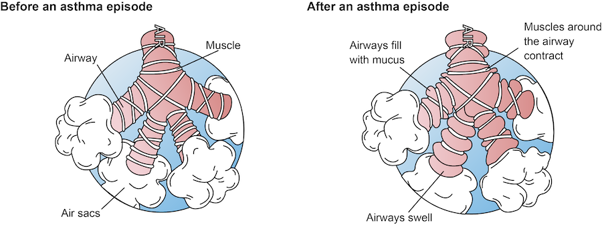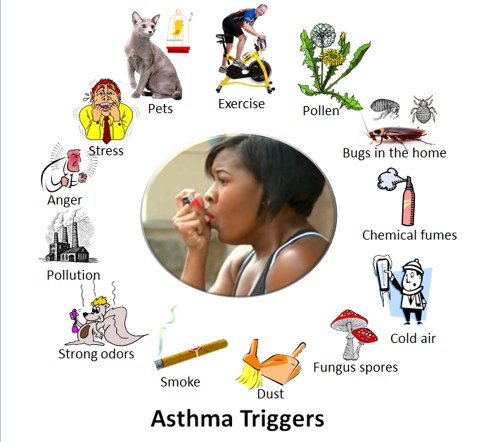
Can asthma run in families? How is it inherited?
July 15, 2019

- Related Topics:
- Environmental influence,
- Complex traits,
- Asthma
A high school student from the Philippines asks:
"My brothers have bronchial asthma and my parents kept on saying they inherited it from my paternal grandfather, who had bronchial asthma, too. Is that possible? What type of inheritance pattern is it?"
It is possible they inherited it from your grandfather! Bronchial asthma can run in families. Asthma is actually a very complex trait, and is caused by both genetic and environmental factors.
Having a relative with asthma can increase someone’s chances of having it. But since asthma is determined by many different factors, it’s hard to predict.
What is bronchial asthma?
Bronchial asthma is a disease which causes a person’s airways to swell and become constricted. Sometimes the lungs also produce extra mucus, blocking off those airways even more.
This then leads to “asthma attacks”: coughing, wheezing, shortness of breath and chest tightness. Asthma attacks can often be triggered by too much exercise, pollutants in the air, cold air, and more.

What causes asthma?
Asthma is a complex disease, determined by many different factors.
There is a genetic component, with many different genetic variants that can increase the risk of asthma. But there is also an environmental component, with many environmental conditions that can increase the risk.
This makes it hard to predict who will develop asthma. Having just one or two of these genetic variants doesn’t mean you will get asthma. And growing up in a dusty environment doesn’t guarantee asthma either. It’s complicated!

How much of a role does family history play in asthma?
If a parent has asthma, their child is twice as likely to have asthma than someone without this family history. If a parent and a grandparent have asthma, a child is four times more likely to develop asthma.1 Having parents and siblings with asthma also highly increases a person’s risk of getting asthma.2
Children with just a grandparent with asthma were only slightly more likely to have asthma.1
Whether you’re a boy or a girl can also affect how likely you are to get asthma. Boys are twice as likely to get asthma before puberty as compared to girls. However, after puberty, asthma is more common in girls.3
So although a family history of asthma can increase the likelihood of getting asthma, we still can’t predict asthma based on family history due to how complex it is.
Which genes are linked to asthma?
Over a hundred different genes have been linked to asthma! Small changes in these genes can increase a person’s risk of developing asthma. Some families with a high rate of asthma have changes in one or more of these genes.
But because so many genes affect asthma, it’s really hard to predict based on genetics. Let’s look at a few of those hundred genes, to learn a little bit more about how genes can affect asthma.
ADAM33 is a gene that influences lung function in early life. This gene can affect how people exhale and breathe. Changes in the ADAM33 gene are linked to asthma and other respiratory diseases.3
IL-4 is a gene that stimulates the production of IgE antibodies. IgE antibodies are produced by the immune system in response to allergens, which then trigger allergic reactions. Variations in the IL-4 gene can cause the airway to become extra responsive to allergens which lead to severe allergic reactions.3
TGFβ-1 is a gene that affects inflammation. Some changes in the TGFβ-1 gene are associated with increased risk of asthma. But other variations are slightly protective against asthma.3
Keep in mind that you can have the versions of these genes associated with asthma and still not get asthma -- there are just so many other factors that come into play!
As you can see, asthma is a very complicated disease where much is still unknown. Scientists are still studying the disease to better understand how to predict and treat it.
Read More:
- Medline: Allergic Asthma
- The Scientist: Asthma, Genetics, and The Environment
- WebMD: Asthma Risk Factors

Author: Harmony Folse
When this answer was published in 2018, Harmony was a Ph.D. candidate in the Department of Genetics, studying fruit fly reproductive development and gene expression in both Joseph Lipsick's and Margaret Fuller's laboratories. As of 2020, they are teaching Biology as an adjunct instructor at various community colleges in the Bay Area.
 Skip Navigation
Skip Navigation
